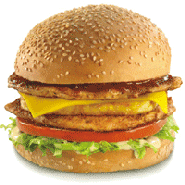Technological change is fattening, Professor Carol Propper will say when delivering a lecture as part of the ESRC Social Science Week on Thursday 23 June. Not only has agricultural innovation lowered the price of food but, at the same time, technology has made work far less strenuous so we must now pay for, rather than be paid to, exercise.
The combination of lower costs of consuming calories and higher costs of expending calories is behind the dramatic rise in obesity in the UK. Just ten years ago, 13% of men and 16% of women were too heavy for their height. Today, the figure is over 21% for both sexes - one in five of the adult population. And it comes at a high cost: 30,000 deaths a year are caused by obesity in England alone, and the condition costs the NHS £500 million a year and the economy £2 billion through sickness and early deaths.
Professor Propper will describe a series of key findings in the economic analysis of obesity and their implications for public policy, both here and in the United States, the only major economy with a worse obesity problem than us:
- We eat more because of improved technology: from the microwave oven to flavour protecting preservatives to packaging, technology has cut the time taken to prepare food. Food is cheaper, not only in the hours on the job it takes to earn money to buy dinner, but also in the minutes needed to make it. In 1965, non-working married women spent over two hours a day cooking and cleaning up from meals; now, the same tasks take less than an hour. This fall in time price has led to an increase in the quantity and variety of food consumed.
- Lessons from the potato: before World War II, Americans ate massive amounts of potatoes: largely baked, boiled or mashed. Chips (French fries) were rare, because the preparation time was high. French fries are now peeled, cut and cooked in factories, then shipped frozen, to be reheated in microwaves. They are now the dominant form of potato in the United States: Americans eat 30% more potatoes than they did 25 years ago, most as fattening French fries.
- Increases in calorie consumption are due to more snacks rather than more calories per meal. For example, around 28% of Americans reported eating two or more snacks a day in 1977-8; now, this number is 45%. This increase in snacking means rising obesity can't be due solely to bigger portions in restaurants or fattening meals at fast food restaurants. The increase in snacks is largely concentrated in snacks at home.
- Weight gain is a function of the size of your wallet: people with the greatest ability to take advantage of the lower price of food preparation - the poor have gained most weight. Calorifically speaking, the best bargains are packed with sugar, fat and refined grains. Processed foods are also more accessible: their long shelf life means they are in most stores. For poorer people, the cost of using such stores is lower than finding the healthy, more expensive alternative. Poor children - at least those in urban areas - also face higher costs of exercise: green spaces are further away and the streets are less safe.
- Misplacing the blame: many of the culprits blamed for the increase in obesity in popular discussion - for example, the rise in restaurants and fast food outlets and the greater amount of pre-prepared food in supermarkets - are not the causes of the increase in obesity, but the correlates. Faster food is a natural response to the increased value of time induced by technological change: the output forgone by a meal produced at home has risen, so individuals will demand faster food, both at home and in the market.
- Should we tax fast food? The standard rationale for government intervention to alter prices, through either taxes or subsidies, is market failure. But the market failure arguments in favour of reducing obesity may be limited. The private benefits of not being obese far outweigh the social benefits. In a world in which being slim is seen as beautiful, there are large private gains to being thin but few external benefits to others. What's more, taxing fast food would hit the poorest hardest, as they are the biggest consumers of such food.
The lecture 'Why Economics is good for your health' takes place on Thursday 23 June 1.30pm to 3pm. The Wills Memorial Building, University of Bristol, Queens Road, Bristol. Admission is free of charge.
